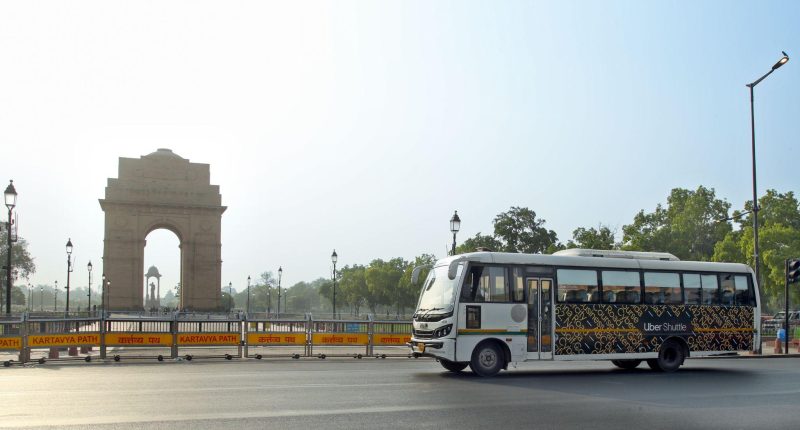Delhi would soon see commuting options in the form of private buses, from Uber and Aaveg. Ride-hailing giant Uber and app-based shuttle service provider Aaveg have been granted licenses by the Delhi Transport Department to operate premium bus services in the national capital. The launch of premium bus services won’t happen overnight. While Uber is poised to start operations imminently, Aaveg plans a more delayed rollout following the Lok Sabha elections.
The concept of premium bus services isn’t entirely new territory for Uber. The company has already been piloting its Uber Shuttle service in Delhi for some time. The introduction of Uber’s “premium bus service” is likely to be a boon for Delhi, which – like many major cities worldwide – is known to face public commuting woes, despite having one of the most expansive metro networks globally.
The ever-increasing number of private vehicles on the road translates to gridlocked streets, leading to longer commutes, frustrated drivers, and a significant strain on existing infrastructure. Furthermore, these vehicles contribute heavily to air pollution, a major public health concern in Delhi. Overcrowded public transport options, often exceeding their capacity, further discourage commuters from leaving their cars behind.
This is where the premium bus services by Uber and Aaveg come in, and seem to be a timely intervention aimed at providing a sustainable solution. These services are expected to attract commuters who are looking for more comfortable and reliable transportation options, thereby reducing the reliance on private vehicles. By catering to a specific segment – the upper-middle class – these services hope to reduce the overall number of cars on the road, thereby alleviating traffic congestion and its associated environmental consequences. The Delhi government’s app-based premium bus aggregator scheme, notified in November 2023, mandates that operators maintain a fleet of at least 25 premium buses, which must be deployed within 90 days of license issuance.
“We are committed to building a business which serves the mobility needs of every Indian – buses are an important addition to our available products. After a successful pilot where we’ve seen a strong demand for buses, we are excited to formally bring the magic of Uber rides to buses in Delhi,” Amit Deshpande, head of Uber Shuttle, India, commented on the matter.
While Uber is a household name, the operation of these premium buses won’t be a solitary endeavor. The company will be collaborating with local fleet partners responsible for managing the bus fleets, with individual buses offering seating capacities ranging from 19 to 50 passengers. As part of the app-based premium bus aggregator scheme, operators are allowed to set dynamic pricing, which must not be lower than the peak fare of DTC air-conditioned buses. This pricing model is intended to encourage upper-middle-class residents to opt for these premium services over personal vehicles. Uber plans to operate its buses on routes connecting residential areas with key business districts, covering various parts of Delhi to ensure broad accessibility.
According to media reports, unlike the standard public bus experience, these premium buses are designed to provide a significantly more luxurious and hassle-free journey. Passengers can expect air-conditioned interiors offering a welcome respite from Delhi’s harsh weather conditions. Features like Wi-Fi connectivity will ensure passengers can stay connected and entertained during their commutes, while phone charging facilities will be made available as well. These air-conditioned buses will be equipped with GPS, CCTV cameras, panic buttons (allowing passengers to discreetly seek help if needed), and 2×2 reclining seats to ensure passenger comfort and safety as well.
From the looks of it, passengers will have assigned seating (which is unlike the jostle for seats on a crowded bus) and can manage their trips through an app, which allows for booking, cancellation, and rescheduling. Uber’s service will enable users to book seats up to seven days in advance, with drivers waiting for up to two minutes at pickup points. Real-time bus information and timings will be readily available within the app, eliminating the uncertainty often associated with public transportation schedules.
The Tech Portal is published by Blue Box Media Private Limited. Our investors have no influence over our reporting. Read our full Ownership and Funding Disclosure →






